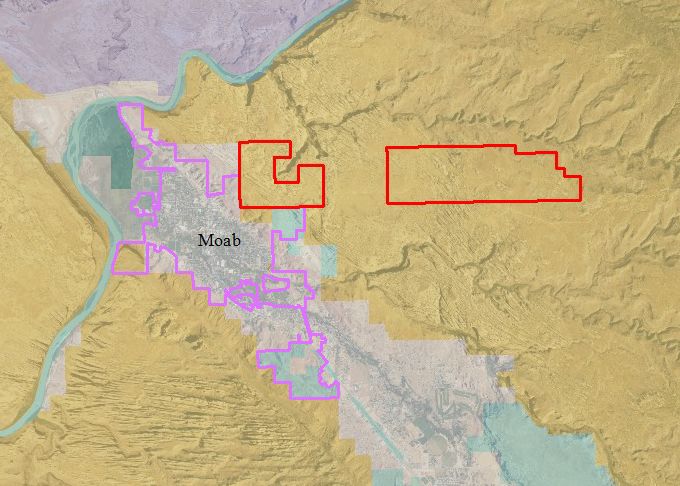Some information may be outdated.
Many Grand County residents and outdoor recreators from all over the world are likely relieved that the Utah State office of the Bureau of Land Management has removed two controversial parcels, located in the Sand Flats Recreation Area above Moab, from consideration for an oil and gas lease sale scheduled for June of this year. The two parcels sit on top of Moab’s sole-source aquifer, which provides drinking water for most of Grand County’s population, as well as being adjacent to the world-famous and well-loved Slickrock Bike Trail.
In past weeks, both the City of Moab and Grand County issued statements opposing the inclusion of those lots in the sale. Grand County’s resolution asserted that opening the area up to energy development “would constitute irresponsible natural and economic resource development in the region.” The City’s resolution suggested that the BLM “identify other locations for oil and gas leases which have considerably less impact and risk to residents, visitors, Moab’s tourism economy, and water resources.”
Even before the public comment period on the sale opened, locals and others were adding their voices to that opposition. A letter addressed to the Secretary of the Interior David Bernhardt, signed by 80 companies from 20 states, implored Bernhardt to remove the parcels and urged him to lead his department in placing a high value on recreation economies.
Ashley Korenblat, CEO of the local bike guiding company Western Spirit Cycling and managing director of the local advocacy group Public Land Solutions, organized a press call with Moab Mayor Emily Niehaus, Grand County Council Chair Mary McGann, and local business owner and City Councilmember Karen Guzman Newton, in which those community leaders expressed their hope that Utah Governor Gary Herbert would join them in their opposition to energy development in the Sand Flats Recreation Area.
During the press call on Feb. 18, Niehaus pointed out there are “many, many parcels in Grand County that have been leased for oil and gas that have not yet been developed.” She expressed confidence that the governor would listen to the concerns of Moab locals and enter the discussion on their side.
Herbert complied, issuing a statement through his office’s communications director, Anna Lehnardt.
“The Governor appreciates the unique beauty of the Slickrock area and wants to ensure that nothing is done that would be detrimental to the visitor experience or local water quality,” the statement read. “He has asked the Bureau of Land Management to defer the lease sales and consider more fully how they might impact those factors.”
Following this statement, the BLM did defer the parcels in question, issuing a press release saying that they had heard the public’s concerns and that the agency values both recreation and responsible energy development on BLM lands, as well as positive relationships with local partners.
“After careful consideration and analysis over the last two months, those parcels will not be included in the proposed June oil and gas lease sale,” said Moab Field Manager Nicollee Gaddis-Wyatt in the release.
The two parcels won’t be included in the state-wide June lease sale, but advocacy groups like the Outdoor Alliance and Public Land Solutions aren’t relenting in their opposition to the Trump administration’s Energy Dominance policy they say has prioritized energy development over all other uses of public land.
“The Energy Dominance Executive Order is still in place,” said Korenblat. “So we can expect other problematic parcels (perhaps not so famous) to be nominated for quarterly auctions going forward.”
Korenblat said her organization will continue to discuss the matter with the governor’s office, asking that parcels nominated for oil and gas leasing be vetted through the Director of Recreation and through land management officials who work locally in the area of nominated parcels.
“A system like this would be a much more efficient way to balance our public land use,” said Korenblat.
The Outdoor Alliance is an association of groups that advocate for the conservation of public lands for recreational use. In a Feb. 21 update to a blog post about the controversy, the group celebrated the removal of the Sand Flats parcels from the sale, but tempered the victory with a warning about the state of land management.
“It’s tempting to say that the public spoke up, the agency listened, and the system worked, but that would not be an accurate telling,” reads the Outdoor Alliance blog post. “What this illustrates instead is what “energy dominance” run amok looks like…These parcels never should have been considered for development, and it shouldn’t take a nationwide wave of news coverage and an all-hands effort from the recreation community to keep places like Slickrock free from drilling.”
Korenblat encourages people to stay tuned in and make their views known to land management agencies.
“We should all remember that as consumers of energy, we all have both a right and a responsibility to weigh in on how energy is created,” she said. “My hope is that everyone will take what we have learned about oil and gas development through this Slickrock episode and stay involved—even when the parcels are not in famous places.”
City says no oil and gas in Sand Flats: Council approves letter opposing BLM move – Jan 30, 2020
Sand Flats areas considered for oil and gas lease – Jan 16, 2020
Appreciate the coverage? Help keep local news alive.
Chip in to support the Moab Sun News.





